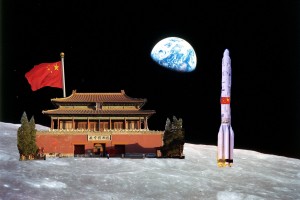China has already sent two unmanned lunar probes to the moon, and China has bold plans to send several astronauts to the moon by 2017. While those Chinese astronauts are on the moon, they plan to mine helium 3, an ideal fuel for nuclear fusion. We can assume that when Chinese astronauts step onto the moon, video cameras will be bringing beautiful images back to the world, which will then applaud China’s great technological achievement, to America’s begrudging dismay.
Thus, China is about to a space exploring nation in a dramatic and visible way. This is exactly what American needs. Why? China’s highly visible lunar program comes at a time when American is dramatically cutting its space ambitions (including the Shuttle program). America is being subjected to systematic campaigns disparaging science, much of it driven by religious leaders, corporate disinformation and government attempts to manipulate data. At the same time, anti-science religion is thriving in many American classrooms.
The United States is essentially a warmongering nation; we lurch from war to war. Americans apparently need an enemy to make sense of things. For us to get our heads back into science and math, we apparently need a math and science “enemy,” someone to intellectually challenge our standing as a technologically “advanced” nation.
It is my hope that highly visible and successful Chinese missions to the moon will do to America in 2017 what the Soviet Union did to us in 1957 with the launching of Sputnik.
Remember what happened in 1957? In the years prior to Sputnik, Congress had been obsessed with investigating “Communist activities.” With the launching of Sputnik, the Soviets embarrassed the United States, and we decided to take on Communism with a “space race,” much less harmful than a real war, and with many impressive technological spin-offs. And in the midst of that space race, millions of American students could see science and math in action. They saw high disciplined astronauts employing science to bring back beautiful images from places very far away. The following excerpt is from Wikipedia:
The surprise launch of Sputnik 1, coupled with the spectacular failure of the United States of America’s first two Project Vanguard launch attempts, shocked the United States, which responded with a number of early satellite launches, including Explorer 1, Project SCORE, and Courier 1B. The Sputnik crisis also led to the creation of the Advanced Research Projects Agency (renamed the Defense Advanced Research Projects Agency in 1972): DARPA, and NASA, and an increase in U.S. government spending on scientific research and education. It also inspired a generation of engineers and scientists.
So here’s to the possibility that the Chinese lunar program goads the United States to start taking science and math seriously again. Let’s kick all the disparagers of science and math off of the national stage, completely and forever. Let’s affirmatively honor and support America’s scientists. Maybe then we might find ourselves in the position of doing something technological that is really worth applauding, something other than creating and using ever new high-tech methods of killing people.



"Did you know that the president of China is a scientist? President Hu Jintao was trained as a hydraulic engineer. Likewise his Premier, Wen Jiabao, is a geomechanical engineer. In fact, 8 out of China’s top 9 government officials are scientists. What does the scientific prominence atop China’s ruling body say, if anything, about the role of science and technology in China’s ability to compete against the U.S. and the world in terms of innovation and economic might?"
http://singularityhub.com/2011/05/17/eight-out-of…
I do hope that the Chinese lunar expeditions jolt the United States into caring about science once more. I also hope that it somehow inspires us to see science as a process, rather than a source of military or technological strength. People need to value both the gifts of science and the philosophy of science, and I think the latter is often disregarded.
People look to the products of science, the moon landers and medical advances and engineering marvels, and fail to understand the methodological naturalism and hypothesis-testing that gives birth to them. We have to find a way to make people appreciate science at all times, even when we don't have a new benchmark to meet or a country to beat in innovation. I have no idea how we'll ever get to that point, but valuing intellectual inquiry and learning to see scientists as heroes and leaders would be a hell of a start. Only 47 of the 435 members of the House have degrees in science, and most of them only have Bachelor's degrees. Perhaps by bringing scientific issues to the fore, we can inspire more scientists to run for office and inspire more voters to elect them. We also need to keep pushing for a Science Debate, I think.
Test comment – please ignore.
This is another test comment. Please ignore.
“China launched an experimental module to lay the groundwork for a future space station on Thursday, underscoring its ambitions to become a major space power.” http://www.huffingtonpost.com/2011/09/29/china-space-station_n_986953.html
http://www.nytimes.com/2011/12/30/world/asia/china-unveils-ambitious-plan-to-explore-space.html?smid=tw-nytimesscience&seid=auto